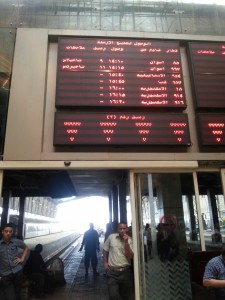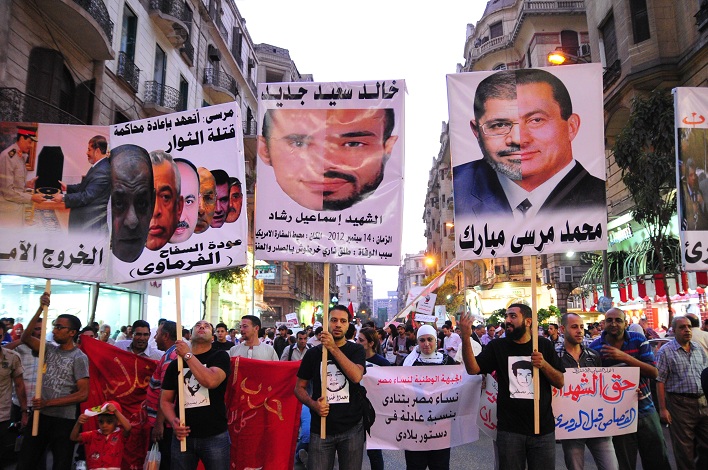
(Photo By: Rana Taha)
Railway drivers partially suspended their strike on Monday after receiving letters saying they had been conscripted into the armed forces and if they continued to strike they could therefore be jailed by the military.
The strike, which paralysed railway traffic nationwide, began on Sunday with drivers calling for better bonuses and compensation rates.
Railway drivers accused the Minister of Transportation Hatem Abdel Latif and Prime Minister Hesham Qandil of maneuvering around the law to disperse the strike in a press conference held at the Egyptian Centre for Social and Economic Rights (ECESR) on Tuesday. They said they received letters from the Central Agency for Public Mobilisation and Statistics (CAPMAS) conscripting them and ordering them to work for the railway. The letters were supported by the Armed Forces.
Saeed Aly, one of the striking co-drivers, said that he received an arrest warrant from the military on Monday night, summoning him to the base of the army’s Company 39. “I went with six other drivers who received a similar warrant,” Saeed Aly said. “We were told that the Armed Forces had ordered us to be arrested if we do not work.”
Saeed Aly said the drivers were forced to sign an agreement that they will return to work. “I will suspend my strike,” Saeed Aly said. “I don’t want to go to jail.”
Khaled Ali, lawyer and director of the ECESR, said that the conscripting letters are illegal. He outlined his intention to challenge them in court.
“We will sue the head of CAPMAS for using Law 87 to send those letters,” Khaled Ali said. “Law 87 can only be used in a state of general mobilization, which is only announced when preparing for a war.”
Saeed Aly said he would not take the risk. “It would take months for the court to resolve the issue, but I could get jailed right away.”
Khaled Ali accused the state of resorting to Law 87 because it is legally incapable of punishing striking workers, as punishment for strikers is illegal under Egypt’s constitution. He said the law was used to “terrorise” workers.
“What is happening is a natural consequence of the International Monetary Fund (IMF) loan,” Khaled Ali said. “The IMF loan is bound to cause a price hike, which would in turn lead to further labour strikes.”
Railway traffic began to pick up on Tuesday morning. Hussein Zakariya, head of the national authority for Egypt’s railways, said a large number of drivers suspended their strike, as reported by the state-owned Al-Ahram.
Drivers entered negotiations with the Minister of Transportation on Saturday. The meeting ended with a decision to increase the salary for drivers’ jobs by 10%. The drivers claimed that the minister told them they could either take the 10% increase or go on strike. They said, after negotiating with other drivers, that they had all decided to go on strike.
The drivers claim the 10% increase would increase their salaries, but will push them into a higher tax bracket. This would mean that their increased tax payments would be greater than the increase in their salaries.
The striking drivers demand the resignation of Zakariya, compensation for long working hours, bonuses, and meal allowances.


